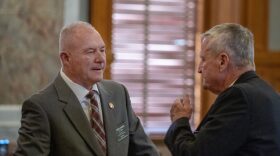Caleb Gayle is an associate professor of Journalism and Africana studies at Northeastern University. His latest book, Black Moses: A Saga of Ambition and the Fight for a Black State, tells the story of Edward McCabe and how he tried to establish Oklahoma as a majority Black state.
Read highlights of the interview below.
Edward McCabe was a Black leader and politician who emerged really at the tail end of reconstruction. He became a politician in Kansas and of all places, Nicodemus, from the westernmost part of the state, and then became this state's auditor, the first Black statewide elected politician in the Old West.
And after losing his third term, he got the opportunity or at least took the opportunity to meet with President Benjamin Harrison to advocate to allow him to make the Oklahoma Territory into a Black governed state.
And of course, Edward McCabe, the braggadocio that he was, made sure to put his name forward as the potential territorial governor because he knew it would soon become a state. And in so doing, he founded several all Black towns in Oklahoma, but was ultimately deeply unsuccessful in his effort.
As we can all see today, Oklahoma is not a Black state.
But he offered an opportunity for those escaping the downfall of reconstruction throughout the American South. Some semblance of a haven for them to escape to, but not just escape to, but build something for themselves on their own terms. And even more than that, he left a legacy which oftentimes gets overlooked because he wasn't necessarily victorious. And all too often, history is written about our winners, not oftentimes our valiant and extraordinary losers.

I feel as if Oklahoma is a place that helps us better understand the country, even though it's all too often overlooked. And Edward McCabe represented perhaps the most extreme example of what happens when you're ambitious, but you don't necessarily have the wares that one needs in order oftentimes in the course of American history to achieve success.
Oklahoma was pitched to a lot of people all across the country as a place to reinvent yourself, to come to the open prairies, to come and become a homesteader, to come and settle this place despite the fact that there were and still are, so many Indigenous nations which have been forced to make Oklahoma home long before.
And on top of that, it invited people to assume that these sorts of opportunities would be equitably distributed, when it was anything but equitably distributed. And in the case of McCabe, he represented to me an exciting story.
A crazy, somewhat braggadocious guy who could convince thousands of Black people to leave the homes and the lives that they knew and to board segregated trains where they were treated terribly. To come to, of all places, Oklahoma.
Not just to come and live, but to be part of building their own Black state.
That just sounds like a crazy interesting story that I almost didn't believe was true. So of course, once I found out that it was years and years ago, I knew I had to write about it. I knew I would be obsessed with it, both from the perspective of being entertained as a reader and a writer, but then also from the perspective of a historian who cares deeply about making sure that all American stories are represented.
And it's complicated, but the rich and beautiful tapestry that we call American history— the collision of those two things, made it such that I just had to write this book.
I had to write this story.

Caleb Gayle will be at All Souls Unitarian Church in Tulsa on Tuesday, Aug. 12 and at Full Circle Bookstore in Oklahoma City on Wednesday, Aug. 13 with his book, Black Moses.
Copyright 2025 KOSU








